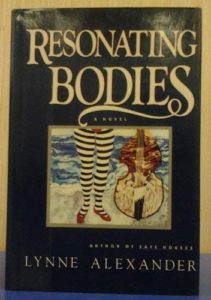Lynne Alexander. Resonating Bodies. Atheneum, 1989. $18.95.
 Imagine, if you will, that you are in love with a violin. This is not an ordinary love that you would have for a woman, for a man. Rather, this is a love that centers on a svelte, sensual and curvy viola with the charms of a sorceress, the hunger and the passion of a beautiful female. She allures no less than she entraps. Her body comes alive with the language of her passion. Writes Lynne Alexander in her second novel, Resonating Bodies, in the voice of Rose, the viola, to her lover and master, Nicholas Jordan: “Listen, Master, while I sing to you. Listen to the music that fills my chest and blossoms forth from my rose hole. Rose of the responsive bosom. The music flutters about inside me: the breasts of the tiny birds inlaid on my fingerboard rise and fall with the strains of my song. … Restrain yourself, Master. I see you would reach out for me yet: the left hand slipping round my neck, the right caressing my polished flanks. I know.” This is the voice of full womanhood speaking to her lover. Yet it is likewise the ultimate displacement of affection, of passion. Thus, it becomes the arena of meta-love, meta-language. In Alexander’s novel, there is the passion of human beings, yet there is not a human being to be found.
Imagine, if you will, that you are in love with a violin. This is not an ordinary love that you would have for a woman, for a man. Rather, this is a love that centers on a svelte, sensual and curvy viola with the charms of a sorceress, the hunger and the passion of a beautiful female. She allures no less than she entraps. Her body comes alive with the language of her passion. Writes Lynne Alexander in her second novel, Resonating Bodies, in the voice of Rose, the viola, to her lover and master, Nicholas Jordan: “Listen, Master, while I sing to you. Listen to the music that fills my chest and blossoms forth from my rose hole. Rose of the responsive bosom. The music flutters about inside me: the breasts of the tiny birds inlaid on my fingerboard rise and fall with the strains of my song. … Restrain yourself, Master. I see you would reach out for me yet: the left hand slipping round my neck, the right caressing my polished flanks. I know.” This is the voice of full womanhood speaking to her lover. Yet it is likewise the ultimate displacement of affection, of passion. Thus, it becomes the arena of meta-love, meta-language. In Alexander’s novel, there is the passion of human beings, yet there is not a human being to be found.
Rose, the viola, the centuries-old symbol of perfection in human craftsmanship, is a voice that utters her history through a bloom of female sexual imagery. She was initially created by a craftsman as a gift for his young wife. Yet, Rose tells us, the young husband was the man who first loved Rose, who held her in his arms and heard her plea to be caressed as he invented her. And after losing her first love, Rose then travels through centuries and through countries until she is found by her life-mate, Nicholas Jordan, a child whose father purchased Rose at an auction. Thus our present narrative of Rose and the adult Nicholas begins. They have been lovers for years: Nicholas, the talented performer who plays out his life in the symphony, and Rose the joyous and voluptuous instrument of his passion. Yet now Nicholas has grown old and must relinquish his ownership of Rose to a younger player. As he enters the symphony hall to witness his loss, he and Rose continue still to speak to one another, recounting their life together.
In this way Resonating Bodies is a love song wherein two lovers learn of their mutual affection and of their destiny to be bonded to each other through time. As Rose ultimately speaks to Nicholas of this love: “Don’t let me go … you are my warmth and my reassurance. We are connected by a magic circle: the sound comes out of my body and enters yours and returns to me; you are the continuation of me. You cannot cut me off.”
Review of Contemporary Fiction, Spring 1990